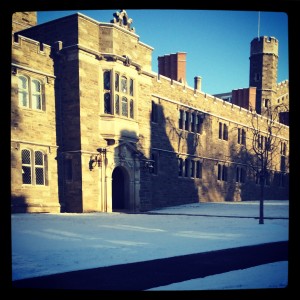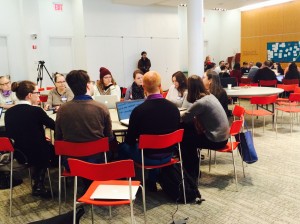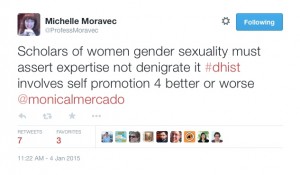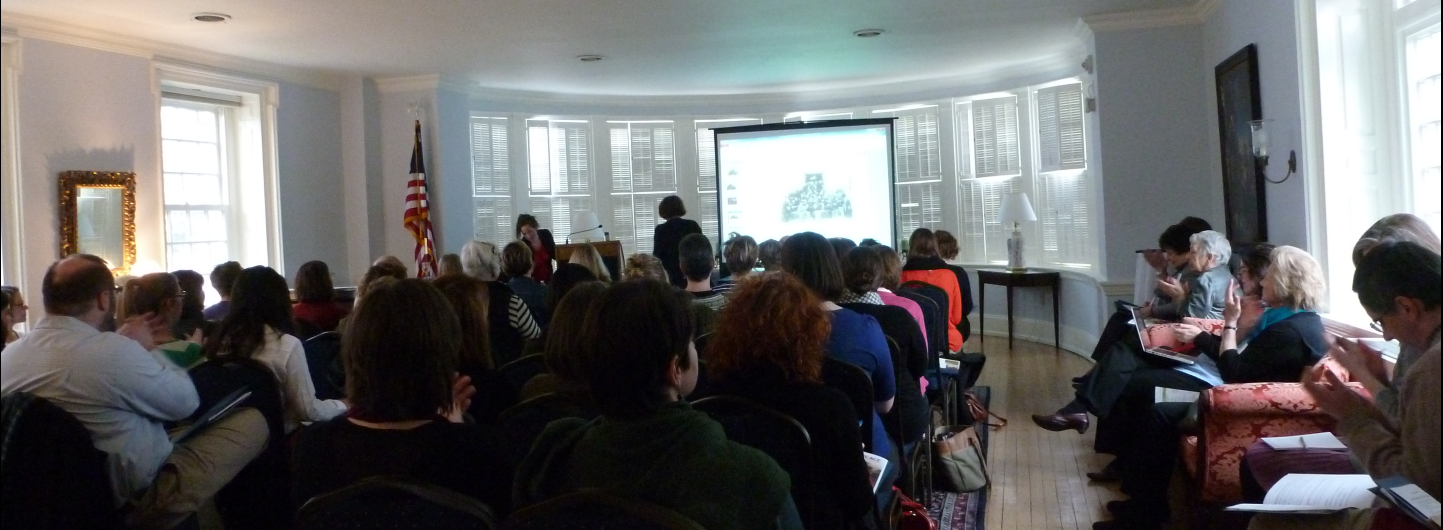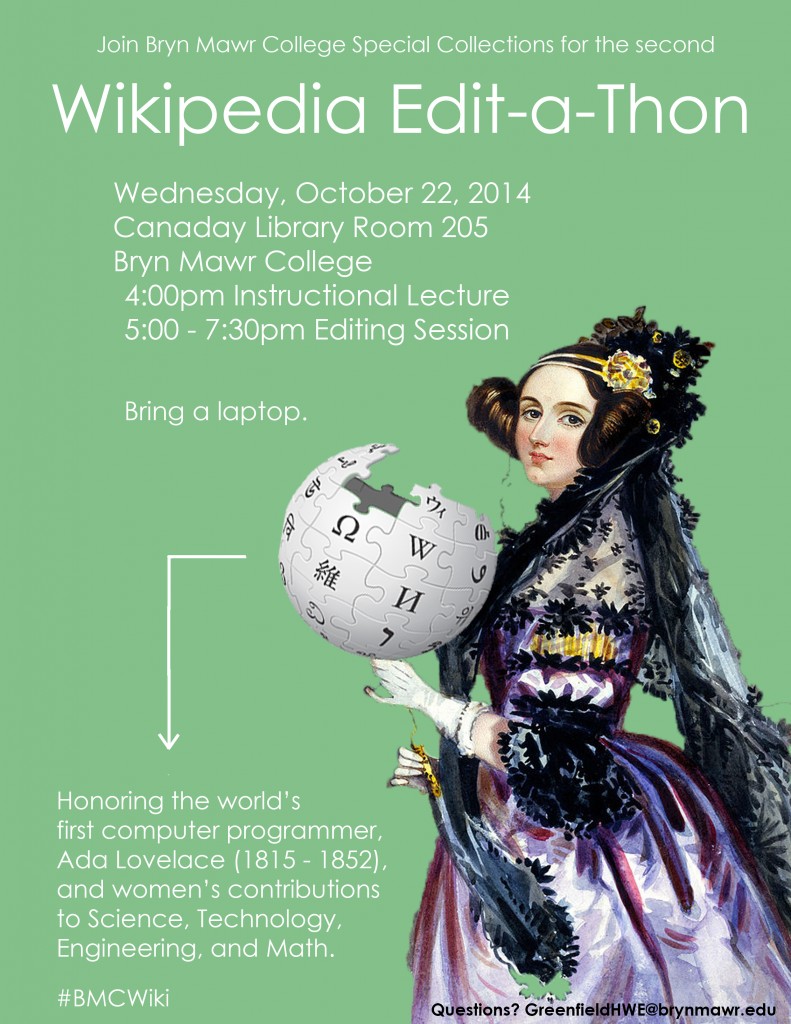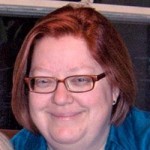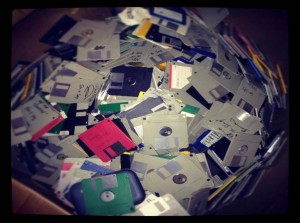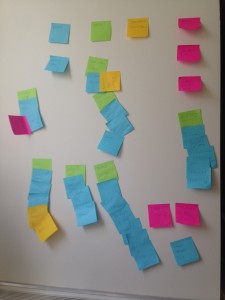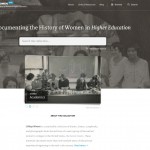 The October talk featuring Greenfield Director Monica Mercado, Rachel Appel (Bryn Mawr College Digital Collections Librarian) and Joanna DiPasquale (Vassar College Digital Initiatives Librarian) is now online via The University of British Columbia Open Collections. “College Women: A Collaborative, Cross-Institutional Archives Portal” begins at 00:14:50.
The October talk featuring Greenfield Director Monica Mercado, Rachel Appel (Bryn Mawr College Digital Collections Librarian) and Joanna DiPasquale (Vassar College Digital Initiatives Librarian) is now online via The University of British Columbia Open Collections. “College Women: A Collaborative, Cross-Institutional Archives Portal” begins at 00:14:50.
Tag Archives: Digital humanities
Women’s History in the Digital World 2015: Register now!
Featured
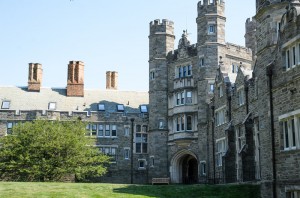
Join us at Bryn Mawr College, May 21-22, 2015! Campus photography via Bryn Mawr College Communications.
Women’s History in the Digital World 2015, the second conference of The Albert M. Greenfield Digital Center for the History of Women’s Education, will be held on the campus of Bryn Mawr College on May 21-22. We aim to bring together experts, novices, and all those in between to share insights, lessons, and resources for the many projects emerging at the crossroads of history, the digital humanities, and women’s and gender studies.
The conference will open Thursday, May 21 with afternoon sessions and a keynote address, followed by a full day of panels scheduled for Friday, May 22. Claire Bond Potter, Professor of History and Co-Director of the Humanities Action Lab at The New School for Public Engagement, will give the conference keynote address at 4:30pm on Thursday, entitled “Putting the Humanities In Action: Why We Are All Digital Humanists, and Why That Needs to Be A Feminist Project.”
A draft program for the two days is now available as a PDF [updated 5/7/15]. We are thrilled to host more than seventy presenters, representing projects from the U.S., Canada, Europe, Asia, and the Middle East.
Sharing Our Work: Reflections on Digital History for the New Year
Featured
Last week, I returned to Bryn Mawr after nearly a week in New York for the annual meeting of the American Historical Association (AHA). My meeting was a busy one — catching up with old friends and mentors, checking in with one of my other professional organizations (the Coordinating Council for Women in History), helping to organize THATCamp AHA, and chairing a panel on feminist work in digital history. It was an exhilarating and exhausting week. But despite the conference fatigue, I left New York feeling energized for the work I’ll be taking on for the Greenfield Center this semester: teaching my first course, Higher Education for Women: Bryn Mawr and Beyond; advising students doing archives fieldwork as part of Bryn Mawr’s Praxis program; continuing to work on the NEH-funded Seven Sisters digital project; and planning our May conference, Women’s History in the Digital World 2015.
Perhaps because our conference CFP is due later this week, I spent a lot of time at AHA thinking about how conferences bring us together, and about how we can support each other and build audiences for our work. I spent much of my time on Twitter, like my colleague Shane Landrum, who argues, “Live-tweeting #AHA2015 is, for me, a way to turn note-taking into a tiny bit of professional service [and] make what we do more public and visible.” It is also a way for me to promote digital projects that don’t always receive attention (or funding).
So that’s how I found myself, for the first time, live-tweeting while seated as panel chair at Session 159: Can DH Answer Our Questions: Using Digital Humanities to Address the Concerns of Feminist Historians. To audience members unfamiliar with the ways of the #twitterstorians, it would have looked surprising to see a panel chair typing away during each speaker’s presentation, but in a meeting as heavily tweeted as AHA, I wanted the research of our three scholars — panel organizer Kathryn Falvo, Tamika Richeson, and Wendy E. Chmielewski — to be captured and shared as widely as possible. Indeed, the Storify that Kate Moore created to record our session serves as a useful tool for circulating the discussion beyond our conference room.
As the panelists made their remarks, I found myself scribbling down a new conclusion to my comments:
This panel convinces me more than ever before that we shouldn’t have to fear the loss or muting of women’s voices — both scholars and historical subjects — in the rise of digital history, but we do need to continue to be vigilant about getting our work out there. Over the weekend, I’ve been eyeing the digital workshop, sessions, lightning rounds, posters, and proposals coming in for Tuesday’s THATCamp, and I’ve been thinking critically about the digital projects drawing the most attention and conversation. Do they take seriously histories of women, of gender, or sexuality? There’s a reason you may have seen me tweeting during these presentation: We have to be researchers, digital historians, and promoters.
Michelle Moravec, who spoke at AHA about her practice of writing in public, made a similar point:
In that spirit, I’d like to share just a few of the digital projects dealing with histories of women, gender, and sexuality that caught my eye at AHA this year:
- Her Hat Was In the Ring! U.S. Women Who Ran For Political Office Before 1920, created by created by Wendy E. Chmielewski, Jill Norgren, and Kristen Gwinn-Becker
- #QSWG, The Queering Slavery Working Group, organized by Vanessa Holden and Jessica Marie Johnson
- The Shirley Chisholm Project: Brooklyn Women’s Activism from 1945 to the Present, founded by Barbara Winslow
- United States of AIDS, led by undergraduate researchers Guy Greenberg and Norma Juarez (and supervised by Women’s History in the Digital World keynote speaker Claire Potter)
If you have a project to share, or are looking for possible collaborators and conversation partners, I encourage you to submit to Women’s History in the Digital World this week, and to save the conference dates: May 21-22, 2015. I’m excited that the Greenfield Center can play a role in the work of promoting diverse projects in digital history; in the coming weeks, we’ll be sharing details on scheduling, registration, and accommodations. In the meantime, we welcome your ideas and questions — in the comments below, or via email to greenfieldhwe [at] brynmawr [dot] edu.
“Can DH Answer Our Questions?” Looking Ahead to AHA 2015
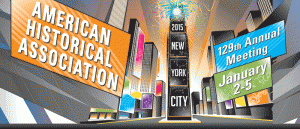 It’s finals week at Bryn Mawr, which means that campus is getting quieter by the day. But for historians like me, the December break also requires getting ready for the American Historical Association (AHA) annual meeting, held the first weekend of the new year. On Sunday, January 4, I’ll be chairing a fantastic session organized by Penn State graduate student Kathryn Falvo, featuring work at the intersection of women’s and gender history and the digital humanities. We’ll be joined by new University of Virginia Ph.D. Tamika Richeson, and Dr. Wendy E. Chmielewski, George Cooley Curator of the Swarthmore College Peace Collection. Set your alarm clocks: we’re scheduled for a 9am start, discussing topics central to the Greenfield Digital Center’s mission:
It’s finals week at Bryn Mawr, which means that campus is getting quieter by the day. But for historians like me, the December break also requires getting ready for the American Historical Association (AHA) annual meeting, held the first weekend of the new year. On Sunday, January 4, I’ll be chairing a fantastic session organized by Penn State graduate student Kathryn Falvo, featuring work at the intersection of women’s and gender history and the digital humanities. We’ll be joined by new University of Virginia Ph.D. Tamika Richeson, and Dr. Wendy E. Chmielewski, George Cooley Curator of the Swarthmore College Peace Collection. Set your alarm clocks: we’re scheduled for a 9am start, discussing topics central to the Greenfield Digital Center’s mission:
AHA Session 159: Can DH Answer Our Questions? Using Digital Humanities to Address the Concerns of Feminist Historians
Reflecting on her work on women who ran for office prior to 1920, Wendy Chmielewski questions the gendered aspects of digital research and presentation. Does digital research help scholars craft better or more complex questions about our historical subjects or create a different historiography? As a digitized medium becomes standard, questions of methodology, funding, and presentation are of the utmost importance. Tamika Richeson’s presentation will explore a DH project she has been working on that uses Omeka and Neatline to look at over 450 arrests of black women in Washington D.C. from 1830-1867. Tamika is concerned with placing these black women’s arrests in a larger digital narrative – one which can help historians access the lives of lower class black women in a way that traditional methodologies cannot. Similarly, Kathryn Falvo examines the lives of traveling Quaker women in the nineteenth century by using another mapping tool, ArchGIS. By tracing these women’s lives through their movements, we can better understand the role of female ministers within the Society of Friends and their lived experience as ministers. Here, too, mapping technologies facilitate an understanding of lived experience that more traditional methodologies cannot accommodate. Can DH methods accommodate the questions that feminist historians seek to answer?
![]() Our session is just one piece of a terrific slate of digital history opportunities at this year’s AHA, and I’m looking forward to a long weekend of good conversation and learning about new projects and tools.The conference has a brand-new smartphone app that will guide users to all things digital (check out the snappy logo, left). And if you’re planning to be in New York, there are still opportunities to present and meet outside of the formal panels: one of the first receptions of the conference is the now-annual reception for history bloggers and #twitterstorians on Friday, January 2, and the AHA recently posted a call for Digital “Lightning Rounds” on Saturday, January 3.
Our session is just one piece of a terrific slate of digital history opportunities at this year’s AHA, and I’m looking forward to a long weekend of good conversation and learning about new projects and tools.The conference has a brand-new smartphone app that will guide users to all things digital (check out the snappy logo, left). And if you’re planning to be in New York, there are still opportunities to present and meet outside of the formal panels: one of the first receptions of the conference is the now-annual reception for history bloggers and #twitterstorians on Friday, January 2, and the AHA recently posted a call for Digital “Lightning Rounds” on Saturday, January 3.
But there’s more!
With the support of AHA Director of Scholarly Communication and Digital Initiatives Seth Denbo, and historian Claire Bond Potter at The New School for Social Engagement, at the conclusion of the meeting we’ll be gathering for THATCamp AHA on Tuesday, January 6. Along with co-organizers Dan Royles and Shane Landrum, I’m excited to welcome both digital history veterans and newcomers to The New School for a day of unconferencing that will include a handful of prescheduled workshops on topics ranging from social media to social justice. Slots for THATCamp are filling up quickly–register here!
* * *
Speaking of conferences, we’re also busy these days on the receiving end of paper and panel proposals for the Greenfield Digital Center’s next conference, Women’s History in the Digital World, scheduled for May 21-22, 2015. The deadline for submitting a proposal is one month away — Friday, January 16 — so do contact the Center via email, leave a comment below, or catch me at AHA if you have questions or ideas (find our CFP, here). Can DH answer our questions? We’ll have lots of opportunities in the coming months to find out.
Evolution and Tradition: Learning from Digital Culture while Honoring the Past
Featured
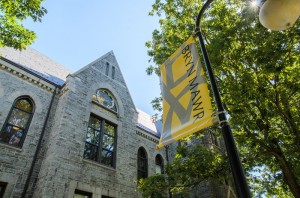 Most of our past reflections on the relationship between our digital mode and the content we publish have been concerned with how different platforms influence the messages we craft. However, we haven’t given as much space to the equally interesting matter of how the culture surrounding digital tools resonates with aspects of our subject matter.
Most of our past reflections on the relationship between our digital mode and the content we publish have been concerned with how different platforms influence the messages we craft. However, we haven’t given as much space to the equally interesting matter of how the culture surrounding digital tools resonates with aspects of our subject matter.
In September, Joshua Kim published an article in Inside Higher Ed entitled “Is Digital Culture Changing Academic Culture?” In the piece, Kim reflects on the contrast between “digital culture,” which he characterizes as rapidly-evolving and experimental, and the “solid and stable” nature of traditional academic culture. Each holds apparent value: the agile and non-hierarchical nature of digital culture allows for exciting collaborations to arise, stoking innovation, while the long-reaching histories of established universities lend “a foundation on which to build.” As digital scholarship percolates in institutions of higher education, conflicts (or at least growing pains) can arise, but Kim argues that despite the apparent incongruity, universities could reap great benefits by incorporating some of the aspects of digital culture that initially seem at odds with their tradition-oriented culture.
The article has stuck with me in the last few months as I’ve considered Kim’s point in relation to how schools address issues of social inequality on campus. Academic culture benefits from stability for many reasons, and tradition can be an integral and important part of educational experience (just ask a Mawrter). But there are ways that this constancy can feel like entrenchment that reach even beyond the domain of digital versus analog scholarship. Kim’s reflections on digital culture reminded me of current ongoing dialogues both in and outside of the academy on difficult issues such as race, gender, and sexual assault; issues in which rapidly evolving approaches to inclusion and identity run up against deeply ingrained societal problems.
Call for Papers: Women’s History in the Digital World 2015
Featured
Women’s History in the Digital World 2015, the second conference of The Albert M. Greenfield Digital Center for the History of Women’s Education, will be held on the campus of Bryn Mawr College on May 21-22.
We aim to bring together experts, novices, and all those in between to share insights, lessons, and resources for the many projects emerging at the crossroads of history, the digital humanities, and women’s and gender studies. Continuing a conversation begun at our inaugural meeting in 2013, the conference will feature the work of librarians and archivists, faculty, students, and other stakeholders in the development of women’s and gender histories within digital scholarship.
The conference will feature a keynote address by Claire Bond Potter, Professor of History and Co-Director of the Humanities Action Lab at The New School for Public Engagement.
Panels will be scheduled during the afternoon on Thursday, May 21, and on Friday, May 22; a projects showcase and digital lab will offer opportunities for unstructured conversation and demonstrations.
We invite individual papers or full panel proposals on women’s and gender history projects with a digital component, investigating the complexities of creating, managing, researching and/or teaching with digital resources and digitized materials.
All thematic areas, geographies, and time periods are welcome: this is a chance to share knowledge, network, and promote collaborations that locate new possibilities.
To submit a proposal, please send the following information by email to greenfieldhwe@brynmawr.edu:
- complete contact information including current email and institutional affiliation, if any;
- short (150-200 word) biography for each presenter; and
- abstract (s) of the proposed presentation (500 words for single paper, poster, or demonstration, or 1,500-2000 words for panels of 3 papers)
The deadline for submissions is Friday, January 16, 2015.
For updates, follow the Greenfield Digital Center on Twitter @GreenfieldHWE and the conference hashtag, #WHDigWrld15.
* * *
Women’s History in the Digital World is organized by The Albert M. Greenfield Digital Center for the History of Women’s Education with the support of Bryn Mawr College Libraries and The Gladys Krieble Delmas Foundation.
Upcoming Wikipedia Edit-a-Thon, October Edition: Ada Lovelace and Women in STEM
Join the Greenfield Digital Center and Bryn Mawr College Special Collections for our second Wikipedia Edit-a-Thon!
Our first edit-a-thon this past March was a collaboration with the “Seven Sisters” colleges for women’s history month. This time around we’re riffing on the theme, with a twist for October: we will be focusing on using materials from the College archives and manuscripts collection to enhance articles on women in technology in honor of Ada Lovelace Day and American Archives Month.
Who was Ada Lovelace?
Ada Lovelace was a female mathematician who lived from 1815-1852, and is often described as the world’s first computer programmer. Though computers as we know them today obviously did not exist in her time, Ada is credited with writing the first algorithm for a programmable machine—Charles Babbage’s “Analytical Engine,” a theoretical design that would later form the basis for the first computers built in the 1940s. In today’s male-dominated programming culture, it can come as a surprise that the first person to program a computer was a woman. However, Ada’s contribution was merely the first in a long history of innovations and advancements by women in computing that have been omitted from the dominant historical narrative of technological development. (NPR did a recent piece highlighting Ada’s work and tracing the history of women in computer programming. Listen here.) Women are discouraged from participating in technology today both by a culture that actively excludes them, and by the erasure of the long history of female involvement in and contributions to the field—an act of willful cultural ignorance that obscures potential role models from young women who are interested in pursuing work in computing. This is reflective of similar problems in the larger world of male-dominated STEM* fields. Every October, Ada Lovelace Day brings an opportunity for us to recognize the achievements of women in STEM.
Wikipedia Edit-a Thon 2014: Ada Lovelace and American Archives Month
At 4:00pm on Wednesday, October 22nd, Mary Mark Ockerbloom will join Bryn Mawr College staff, students, faculty, and members of the public in Canaday Library, Room 205 to give an instructional lecture on Wikipedia editing practices. The introduction will be followed by an editing session from 5:00 – 7:30 in which attendees can work on articles individually or in groups. The focus will be on women in STEM in the College archives, but participants are invited to bring their own projects or use the College collections to improve an article on any topic. Bring an idea, bring a friend, and bring a laptop and charger for editing. RSVP (optional but encouraged) on the Wikipedia project page or by emailing GreenfieldHWE@brynmawr.edu.
There is absolutely no experience necessary, though it is recommended for new editors that you create an account prior to the event. Attendees may feel free to come and go as needed. Snacks will be provided.
Can’t make it in person?
Participate remotely! Work on a suggested article from this list, watch our progress and document your own on the etherpad document, and use the hashtags #BMCwiki, #ALD2014, and #ArchivesMonth!
Want to learn more about archives and the digital record? Come to our Personal Digital Archiving Day on Thursday, October 23rd—learn how to save your digital materials long-term!
*Science, Technology, Engineering and Math
“Where We Are…”: Adventures in Mapping Bryn Mawr History
Featured
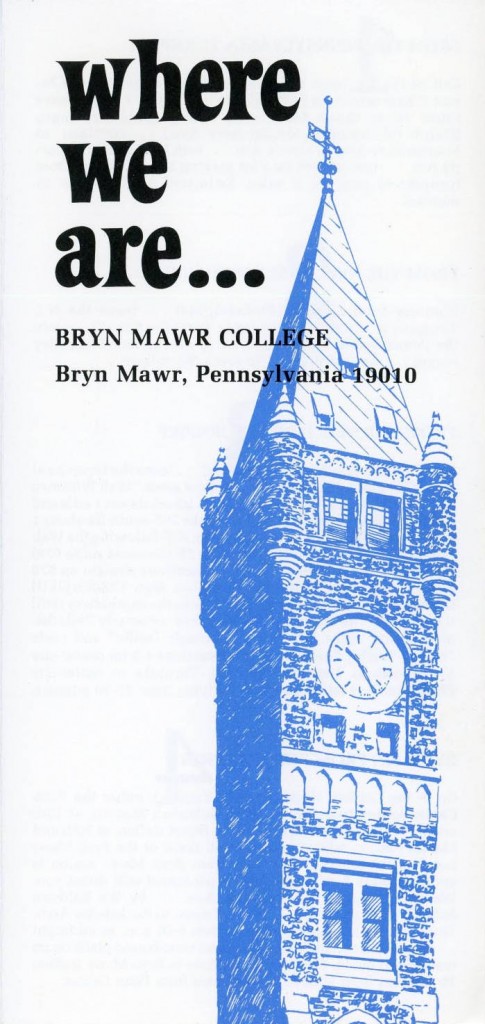
Bryn Mawr College driving directions (n.d.) in Bryn Mawr College Campus Maps.
Maybe it’s because I’ve only been here for two months, or maybe it’s just nostalgia for my own college days, but with Customs Week at Bryn Mawr wrapping up, and classes getting underway, I’m feeling sympathy for new students and faculty navigating campus. Even with ten days living in a Pem East single as a CLIR Fellow under my belt, I still keep a copy of the current campus map in my bag and bookmarked on my iPhone. (At least I’m no longer confusing Taylor with Thomas!)
I’ve also been thinking a lot about maps after taking my first introduction to ArcGIS mapping software last month, as part of a Mellon-funded Tri-Co Environmental Studies initiative organized by Swarthmore College. Over three days, I joined nearly twenty Tri-Co faculty members interested in the possibilities of organizing spacial data. With most of us new to ArcGIS, the workshop opened with two basic questions:
- What kinds of spacial questions do you encounter in your research?
- What kinds of spacial questions do our students encounter in their classes?
To put it another way, maps can tell us where we are, but can they tell us who we are?
Scalar: A Digital Take on Physical Space
Featured
This piece originally appeared on the blog of the Tri-Co Digital Humanities Initiative, who have sponsored Brenna Levitin (BMC ’16) as our intern this summer. In addition to the two posts she has published on the Tri-Co DH site, Brenna has published regular updates on this blog. To catch up with her summer work, read her thoughts on a find in the 1989 Alumnae Bulletin, her consideration of silence in the archives, and her approach to using digital tools to address the silence.
When I last wrote, I optimistically assumed that July would be for oral histories and August would be for creating the exhibit. In reality, oral history work has bled over into August, and I’ve actually been building the exhibit since mid-July. I also described the analog/digital split in my project, which has evolved; as August has worn on, I’ve simultaneously handled our first donations of alumnae/i materials (flyers, photos, etc) while drafting the actual pages of the exhibit.
As the first Scalar project undertaken at Bryn Mawr Special Collections, I am conscious of my duty to document the process. Scalar has offered me enormous freedom to design the exhibit in any multi- or non-linear way that I wish. That freedom is not without a price, however; non-linear documentation means that pages can fall through the cracks; technically contained within the exhibit but unlikely to fall within the viewer’s path. Recently, I struggled to decide how to organize the exhibit in a way that would not imply that this history is complete while still showcasing every possible morsel of information that I gathered. Continue reading
Technology and Feminism: Rethinking our Digital Tools
Featured
June and July have been busy months so far for the Greenfield Digital Center. Rather than a slowing of activity, the departures of students and faculty members from campus have left us free to reach out and connect to broader communities of feminist and digital scholars. I have recently attended several events and programs, including the Digital Humanities Summer Institute in Victoria, British Columbia, Philly DH at Penn, and the “GLAM Day Out” LGBTQ Wikipedia Edit-a-Thon at the Chemical Heritage Foundation in Philadelphia.
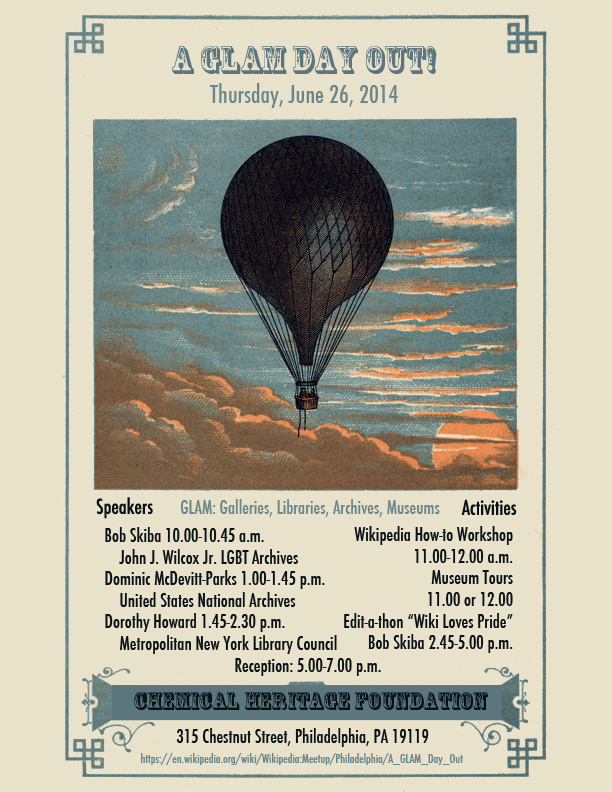 There have been equally exciting developments happening closer to home, as well. Our regular followers will recall that we are hosting summer intern Brenna Levitin with funding and programmatic support from the Tri-Co Digital Humanities Initiative, and, of course, we welcomed Monica L. Mercado as the Digital Center’s new Director on July 1st. The last two months have brought a flood of new ideas, people, and potential research.
There have been equally exciting developments happening closer to home, as well. Our regular followers will recall that we are hosting summer intern Brenna Levitin with funding and programmatic support from the Tri-Co Digital Humanities Initiative, and, of course, we welcomed Monica L. Mercado as the Digital Center’s new Director on July 1st. The last two months have brought a flood of new ideas, people, and potential research.
With new projects underway and a new leader in place, this summer seemed like a perfect transitional moment to do some reflecting on theory and methodology. We have now been using the same tools (Omeka, WordPress, and a handful of others—for two years, and I felt it was time to renew my consciousness of the relationship between the technology we use and the content we produce. When I enrolled in Feminist Digital Humanities at DHSI, my interest in the course was inspired by the idea that it might help me ground a more thoughtful approach to how we use technology to further feminist and historical inquiries at the Greenfield Digital Center.
